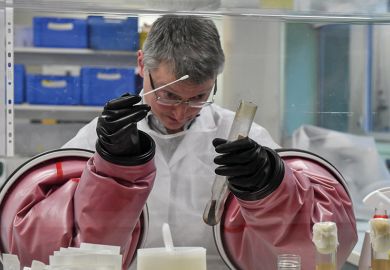Medical researchers who fail to publish the results of clinical trials could be denied approval for future experiments in the UK.
One in four clinical trials of medicines conducted in the country fail to publish their results on time, and one in five clinical trials are not publicly registered as required – a situation that has triggered concerns that healthcare decisions may be taken based on partial information, or that research efforts could be duplicated.
In a new strategy published on 30 July, the Health Research Authority, which is responsible for approving health and social care trials involving people in England, says that it will develop “a policy for how we will assess performance against research transparency requirements and how that will be used when reviewing new studies for approval”.
The new requirement is likely to be introduced during 2021-22, according to the strategy, which was produced in partnership with counterpart agencies in Scotland, Wales and Northern Ireland.
Andrew George, chair of the HRA’s research transparency strategy group, and interim chair of Imperial College Health Partners, said that there needed to be more transparency and openness in medical research.
“It is time for change; better support and encouragement for researchers and research sponsors, greater visibility for patients and the public and fair consequences for those who don’t take transparency seriously,” Professor George said.
The HRA strategy says that applicants for approval are currently required to submit a final report within 12 months of the end of their experiment, but that at the moment “there is no defined dataset for this final report and current resources don’t allow us to chase overdue reports”.
In future, the HRA “will take a more proactive approach to prompting sponsors and researchers of clinical trials to keep their study information up to date in registries and all studies to submit a final report, through systems improvements and monitoring”, the strategy says.
The HRA says that it will use this information to “celebrate good practice and highlight poor performance, by publishing transparency information about individual sponsors”.
“We will take into consideration the extent to which the applicant has fulfilled their transparency responsibilities in relation to their previous studies, when reviewing new studies for approval,” the strategy says.
If implemented, the new rules would fulfil a recommendation made by the House of Commons Science and Technology Committee, which called in a 2018 report for the introduction of sanctions for failing to publish trial results.
In their report, MPs said that the HRA had seemed “reluctant to enforce its rules, or to make previous compliance with transparency legislation a prerequisite for ethical approval of future trials”.
One previous study published in 2018 found that only 11 per cent of clinical trials run by universities across the European Union were complying with the bloc’s reporting rules.
A paper published in The Lancet in 2009 estimated that up to 85 per cent of biomedical and health research may be wasted because it asks the wrong question, is badly designed, is not published or is poorly reported.
Register to continue
Why register?
- Registration is free and only takes a moment
- Once registered, you can read 3 articles a month
- Sign up for our newsletter
Subscribe
Or subscribe for unlimited access to:
- Unlimited access to news, views, insights & reviews
- Digital editions
- Digital access to THE’s university and college rankings analysis
Already registered or a current subscriber?








